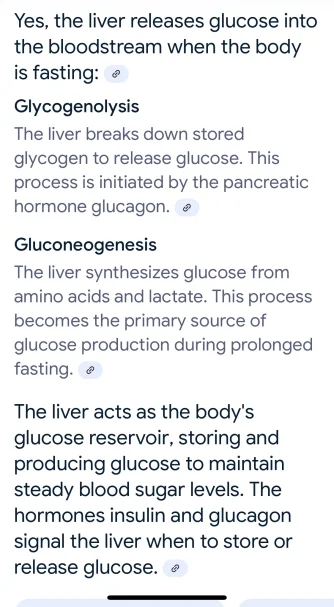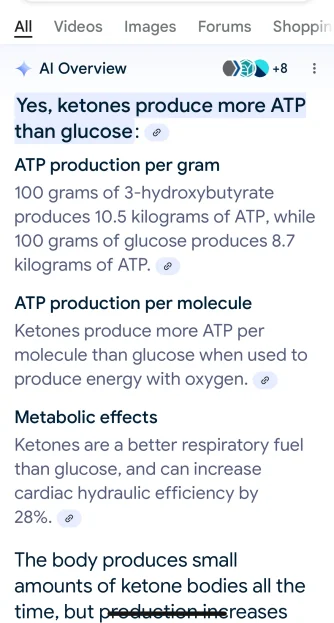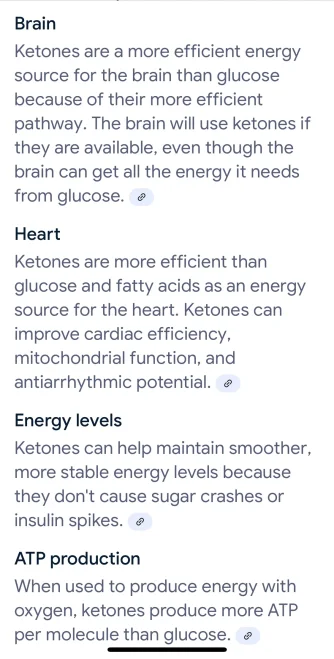It is absolutely debatable, and you are overstating things.
Under normal physiological conditions the brain primarily utilizes glucose for ATP generation. However, in situations where glucose is sparse, e.g., during prolonged fasting, ketone bodies become an important energy source for the brain. [
R]
what does “under normal physiological conditions” mean? That seems like a subjective statement
I just don’t understand how glucose can be the body’s primary/ preferred fuel source, when throughout 99.99% of our evolution, humans would be in ketosis, and primarily run off of ketones. Our specifies has been hunter/ gatherers for almost 2 million years. Which means we would have been in a state of ketosis, the heavy majority of that time. There would have been very few periods where we would have primarily ran off of glucose, for our main fuel source. It’s like saying that dogs and cats primary/ preferred fuel source is glucose, just because that’s what humans mainly feed them, even though throughout 99.99% of their evolution, they were both carnivores, and their body’s ran primarily off of ketones, as their main fuel source. Just because humans currently run primarily off of glucose, because of the poor diets most people eat, does not mean that it’s what our body’s prefer. I can understand why some people can make that connection, but doesn’t mean it’s true
Ketone bodies are believed to be adaptive molecules secreted by the liver and quickly distributed to vital organs as a part of an integrated survival mechanism evolved and conserved to provide bioenergetic and signaling advantages when humans face life-threatening conditions or risk factors that could increase the likelihood of premature death [
R].
Ketones are an emergency energy source, while glucose is the default.
If we consider ketones being produced during a fast, a survival mechanism, wouldn’t the liver releasing stored glycogen, in a fasting state, be considered a survival mechanism? The only difference between these processes, is ketones come from the breakdown of stored fat, and glucose comes from the breakdown of stored glycogen, in a fasting state.
This article has a balanced look at some of the evidence.
In essence, the research has shown that ketosis itself is not an unnatural or even an unhealthy process, and the research shows that ketosis may actually have some benefits for your brain.
However, there’s little research that compares ketones to glucose head to head in terms of brain performance, so it’s hard to categorize either fuel source as “the best” specifically for your brain.
Taking a broader perspective though, a ketogenic diet can actually present long-term metabolic complications. Though ketosis has short term benefits including rapid weight loss, reduced blood glucose, reduced triglycerides, and reduced blood pressure, ultimately it impairs insulin action in your liver and muscle, which can set the stage for an increase in the risk of prediabetes and type 2 diabetes in the long-term.
One alternative to more safely and sustainably produce ketone bodies, while also adding the benefits of weight loss and reduced insulin resistance, is intermittent fasting, strategic periods of fasting that can put your body into ketosis without requiring a high-fat diet.
And when intermittent fasting is combined with a low-fat, plant-based, whole-food diet, you can add the health benefits of eating fruits and vegetables, you can multiply the mental and physical benefits of ketosis, without any of the negative side effects.
...
Ok, the fact that u take this information seriously is honestly concerning. And I’m not trying to be rude or degrading or anything. I unfortunately can’t take anything u say seriously, when it comes to diet and nutrition, if u chose this excerpt to defend ur stance. It’s so ridiculous that I almost feel like it doesn’t even deserve a response. This excerpt says that running primarily off of ketones, can increase ur risk of becoming insulin resistant/ diabetic. This might be the most absurd thing I’ve ever heard, when it comes to diet/ nutrition. In reality, it’s actually the complete opposite. The #1 way to prevent/ cure diabetes/ insulin resistance, is to go on a carnivore and/ or ketogenic diet, and have the body run primarily off of ketones. Doing either diet will always lower A1C levels, lower fasting insulin levels, and improve insulin resistance. Short or long term. There’s plenty of people that have been doing carnivore for the majority of their life, and they’re currently 65+ or older, and have stellar labs, when it comes to A1C levels, fasting insulin levels, and all markers of insulin sensitivity in general. So it’s not like a carnivore/ ketogenic diet only helps with these things in the short term, and in the long term has the opposite effect. So saying that running primarily off of glucose is better to prevent/ cure diabetes, is just an absurd statement to make, and could not be further from what actually happens
Plus, if running off of ketones, primarily, caused insulin resistance and diabetes, in the long term, all of our ancestors, throughout evolution, would have eventually became diabetic. But as we know, diabetes only became a thing once modern agriculture became common. U cannot get diabetes if u primarily consume ruminant animal meat and healthy fats. I challenge anyone to prove me wrong.
Maybe the issue is that people don’t realize how long our ancestors have been hunter/ gatherers for. So I’ll attach a pic of how long we have been doing so. It’s roughly around 2 million years. Again, we have only been running off of glucose, as our primary fuel source, since agriculture became popular. Agriculture came about around 12,000 years ago, and probably didn’t become popular until a few thousand years later. 8-12k years is a blink of an eye, when it comes to our evolution as a whole
And let’s not forget that it’s not debatable that the best food for baby’s is breast milk from their mother. When baby’s are only living off of breast milk, they are in a state of ketosis. Why would the optimal state for a baby be ketosis, but not for a toddler, or child, or adolescent, or adult?



















